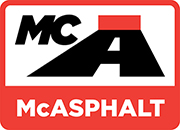History
“Our heritage stays alive”
1970:
McAsphalt Industries Limited was formed by Leo McArthur and John Carrick. The company took its name from the “M” and “C” of its founders’ initials. McAsphalt would be incorporated as distributors, marketers and manufacturers of a wide range of asphalt emulsions and specialty products for the construction industry in the province of Ontario. Our first terminal was located on Sheppard Avenue East in West Hill, ON.
McArthur and Carrick met at Imperial Oil after they finished university—McArthur with a degree in commerce and Carrick with a degree in mechanical engineering.
1971:
McAsphalt hired world-renowned asphalt engineer Dr. Norman McLeod to head up McAsphalt engineering services. Dr. McLeod, recently retired from Imperial Oil, provided the technical and practical framework that has allowed McAsphalt to become the industry leader it is today.
1976:
McArthur and Carrick bought Miller Paving Ltd., a major player in the Ontario road building industry. After that purchase, they vertically integrated the companies, with one supplying asphalt products and design services and the other using them to build roads and bridges. The partners decided to continue to run them as separate businesses; John Carrick remained at the helm at McAsphalt, while Leo McArthur began overseeing Miller Paving.
Throughout the late 1970s and early 1980s, a time when the big oil companies were shutting down refineries in Montreal and Toronto, McAsphalt built and acquired terminals across Ontario, Quebec and Atlantic Canada.
1979:
When oil supply was threatened by increasing instability in the Middle East, McAsphalt purchased a barge with a capacity of 20,000 barrels to ensure continuous supply to their customers.
1986:
McAsphalt entered into a joint venture with France’s Elf Aquitaine to build the first Canadian polymer-modified asphalt production terminal.
1988:
Dieppe, NB, and Montreal, PQ, emulsion facilities were purchased from Koch Industries.
1990:
McAsphalt diversified further with the purchase of Bemac, a company that produced bridge-deck waterproofing membranes and hot-applied rubberized crack sealants.
1993:
With their expanding participation in the marine industry, Sterling Marine Fuels Windsor was acquired from Ultramar, to provide fuel and services to ships operating on the Great Lakes.
1997:
McAsphalt purchased Atlantic Colas—which added two more terminals in Atlantic Canada, in Saint John, NB, and Dartmouth, NS.
1998:
McAsphalt expanded coast to coast across Canada by acquiring four terminals in western Canada from Koch Industries.
2000:
McAsphalt opened their new state-of-the-art Research facility in Toronto, Ontario. It would accommodate all of McAsphalt’s research and development, process design, material testing, technical support for our customers and quality assurance for all the manufacturing facilities.
2002:
McAsphalt launched the brand new Norman McLeod—a 122-metre-long, double-hulled ice-strengthened barge with a 77,000-barrel capacity. “We decided to build the fastest, safest and most efficient barge in the world,” Carrick said at the dedication ceremony. “This is a Canadian venture all the way. While the barge was built in China and the tug was built in Japan, Canadians designed the vessel, Canadians outfitted it and Canadians operate it.”
2003:
McAsphalt closed their flagship terminal in West Hill, ON, and moved emulsion and manufacturing to the Oshawa, ON, terminal. The Oshawa terminal boasts the first fully automated emulsion manufacturing process in Canada.
2005:
McAsphalt purchased the emulsion manufacturing assets of T.J. Pounders in Brampton, ON. Eastern Passage in Dartmouth, NS, was also purchased in 2005, providing a strategic marine terminal for asphalt supply into Atlantic Canada.
2010:
McAsphalt launched their second articulated tug and barge unit, the John J. Carrick and the Victorious—a 122-metre-long, double-hulled, ice-strengthened barge with an 80,000-barrel capacity. McAsphalt also purchased their second Saskatchewan terminal, Ambertec Ltd., in Macklin, SK.
2012:
McAsphalt’s internally commissioned terminal in the Port of Hamilton was officially opened. Boasting marine, rail and truck capabilities, as well as a high production polymer modification system, the terminal is ideally suited for asphalt supply into southwestern Ontario and western New York.
2013:
The McAsphalt internally commissioned Edmonton Terminal was officially opened, State-of the-art blending and polymer modification systems provide our customers with superior quality products—On Time, Every Time.
2017:
The Victorious Tug was renamed the Leo McArthur, the Founders were together again with the Leo McArthur tug pushing the John J Carrick barge. McAsphalt also built a new state of the art polymer modification Facility in Winnipeg with a planned commission in 2018. It is the first polymer plant in the Province and is capable of supplying neighboring Provinces and States.
2018:
March 1, 2018, Colas finalizes the acquisition of the McAsphalt Industries Limited, Colas merges their own companies Colasphalt and STEB into McAsphalt adding 6 Facilities and creating the largest Asphalt Sales and Marketing Company in Canada.
2019:
McAsphalt created a Trans-Canada trucking company merging all of its trucking assets and new additions all into one entity called McAsphalt Logistics Inc, the new company has over 140 sets of trailers to ensure On-Time delivery, a key aspect to our customers satisfaction.

Supporting our customers with superior asphalt products, services and technology for the past 50 years!
